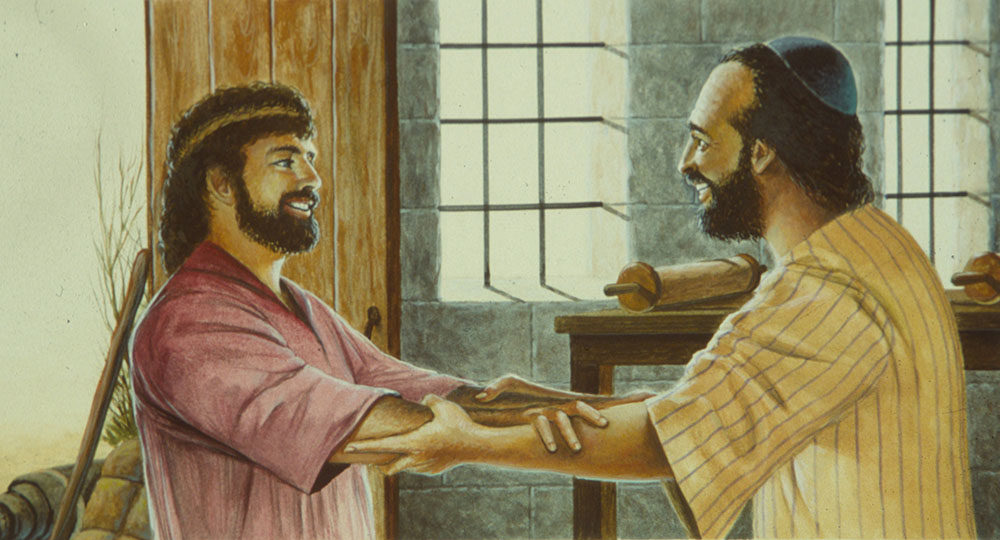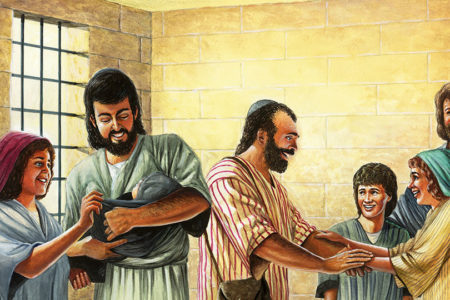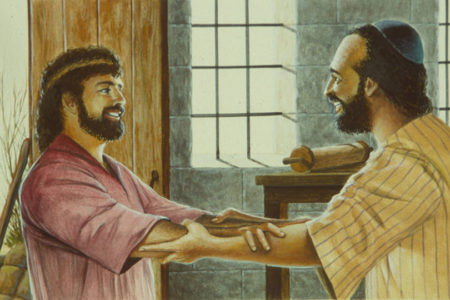Good Tidings From a Young Church 1 Thessalonians 3
Paul had a continual burden for the churches he started. Although he had moved on to other areas of ministry, either by the direct leading of the Lord or by being forced out of an area by persecution, he always desired to return to those fledgling churches and assist the saints as they went on with the Lord.
As the former pastor of three churches, I would love to go back and assist, encourage, and, yes, even exhort those dear folks. After all, I left part of my life there. However, it is not always possible to go back, and many times it is not advisable to return.
The Apostle Paul had founded the church at Thessalonica but had been driven away long before he desired to leave that new ministry. His stay in Thessalonica had been brief, and he longed to return, in spite of the circumstances he might have to face. However, this was not possible, and he had to make the best of the situation.
The Visit of Timothy (vv. 1–5)
When the leaders of the church sent Paul and Silas away after the uprising in Thessalonica, they went on to Berea by night (Acts 17:10). There the people readily received him and studied the Word of God. Many believed in the Lord in Berea, but once again Paul faced persecution from the Jews of Thessalonica, who came to Berea to stir up the people. Again Paul had to leave, this time moving by sea to Athens (Acts 17:14–15). When Paul moved on, Silas and young Timothy remained in Berea. But Paul soon sent for them to come “with all speed” to Athens (Acts 17:15).
He was deeply burdened for the young church at Thessalonica. He was concerned about their welfare and spiritual development. He must have felt that this church might founder under the persecution that had befallen it (1 Th. 3:3a). Paul had advised the Thessalonians that if they lived for the Lord, they could expect trouble, and they had experienced it even while Paul was still with them. He may have also been concerned about this church because of Luke’s report that the men in Thessalonica were less noble than those in Berea (Acts 17:11). Further, Paul knew that it was not only persecution that could trouble these dear saints; he was aware of the activity of that old tempter, Satan (1 Th. 3:5). Were they still going on with the Lord? How was their spiritual welfare? He was concerned that the Devil would lure them away from the will of God and that the seed he had sown would be snatched away before it could take root and grow.
Paul had to do something. Someone had to bring him information regarding the welfare of the church at Thessalonica. Timothy was the man chosen for that task. Paul sent him to Thessalonica to establish the believers and comfort them in the faith (1 Th. 3:2).
The Report of Timothy (vv. 6–7)
How long Timothy stayed in this metropolitan city to carry out Paul’s commission is not known. In all probability, his visit was short—only long enough to greet the people and secure the information requested by Paul. The youthful disciple gave a glowing report of “good tidings of your faith and love, and that ye have good remembrance of us always, desiring greatly to see us, as we also to see you” (v. 6).
What a relief! The Christians at Thessalonica had gone on with the Lord. They had withstood the trials and persecution. The missionaries were “comforted over you in all our affliction and distress by your faith” (v. 7). Their hearts were lifted. Instead of having to encourage the fledgling church, they found their spirits lifted by them. God had truly done a work of grace in the hearts of these dear saints. The fruit of Paul’s answer to the Macedonian call was beginning to manifest itself.
The Reaction of Paul (vv. 8–10)
“For now we live, if ye stand fast in the Lord” (v. 8). “If” in this verse would be better translated “since.” Nothing filled the heart of the apostle with more joy than knowing that these dear ones were standing fast in the Lord. They had withstood the persecution that had come their way; indeed, instead of weakening them or driving them away from the Lord, it had strengthened them and drawn them closer to Him.
Furthermore, when the darts of Satan hit their mark, they had little debilitating effect. The Christians at Thessalonica had held the shield of faith high and had come out victorious. It was Satan who had been defeated, not the young church established by the apostle.
“Now we live,” said Paul. Since these new converts had experienced such victory and were able to continue on, Paul could “live.” Any discouragement he had disappeared. He was encouraged by their faithfulness. God had been good.
Today, nearly two thousand years later, we face similar situations. Too often, when trials or difficulties come into our churches, some of God’s people become discouraged. They give up actively serving the Lord and merely stand on the sidelines. Others fall prey to the attacks of our adversary Satan. As a result, sin enters the Lord’s camp. The testimony of individuals, the church, and the Christian community in an entire area can be weakened or lost. Sad to say, this happens far more than anyone would like to admit.
But Paul could say, “now we live”—the pressure was relieved. Because of the good report of Timothy about the Thessalonian believers, he could relax and move on to other ministries free of concern about the steadfastness of the Thessalonian church. No longer did he have to worry about their steadfastness. Would to God that we could say the same for every Bible-believing church in America today. Paul’s second reaction to Timothy’s good report was that he was now better equipped to pray for these people whom he loved so much. The first aspect of his prayer was thanksgiving. He praised the Lord for this fine group of believers. According to verse 9, he had already been giving thanks to God for them, and now he could continue to do so. His prayers were full of joy to God because of these dear ones.
In verse 10 we read that Paul prayed night and day for this little church. This does not mean that he prayed continually, but that these saints were always on his mind. As he went about his daily tasks, he frequently lifted up the Thessalonian church to God in prayer. In all probability, as he lay on his bed at night, he took them repeatedly to the throne of grace.
Paul’s Purpose in Prayer (vv. 10–13)
Paul prayed for the young church at Thessalonica because he wanted to see them again. He made this clear in two places. In verse 10 he prayed, “that we might see your face.” The “we” could very well be the editorial “we” that Paul used of himself. In verse 11 he asked the Lord to “direct our way unto you.”
Paul wanted to see these people again because they were dear to his heart. He did not desire merely a social visit but, rather, wanted to accomplish something spiritual in their lives. In verse 10 he said that he specifically wanted to see them so that he “might perfect that which is lacking in your faith” (Gr., adjust the shortcomings of your faith). Perhaps there was something “lacking” because Paul had been with them for such a brief period of time before being driven out of Thessalonica. Or the apostle may have learned of some shortcomings due to problems that had developed since his departure. Whatever the case, Paul desired to see them to provide further spiritual assistance. Most likely, their shortcomings were due to a lack of knowledge, and since he was not able to visit them personally, Paul penned some kind admonitions.
He did not suggest that those in the church lacked love for one another. Rather, he desired that their love would increase so that it would provide fellowship and harmony in the church. He also wanted their love to reach beyond the doors of the local assembly to encompass all men. Then their ministry would experience God’s blessing within and touch men without.
Paul gave a very clear example of the type of love of which he spoke—his own love for the Thessalonian church. His love caused him to pray without ceasing for them. It also burdened him to want to visit and assist them. It was a deep, moving love. Would to God that we had this kind of love in our churches today. Things would be different, and lives outside of the church would be touched for the Lord. That is what Paul expected of the church at Thessalonica; it is what the Lord expects of our churches today.
Isn’t it interesting that Paul did not speak of their physical strength? That is what the world would look for. The apostle was concerned, rather, with the spiritual strength that comes only by abiding in Christ.
Paul wanted to visit these people so that he could strengthen them in the Lord. He wanted them to be blameless before God. That does not mean that he expected them to become sinless, for no one can achieve sinless perfection in this life. But he wanted their accounts with God to be kept short. When sin was committed, forgiveness was to be sought immediately. The same pattern should be true today. We must constantly search our hearts and recognize our sin. We must then seek cleansing from that sin (1 Jn. 1:9). Finally, we must walk in constant fellowship with our Lord.
Paul also wanted the Thessalonians to be holy. In chapter 4, verse 7 we read, “For God hath not called us unto uncleanness, but unto holiness.” Belonging to the Lord should produce a holy life. God says, “Be ye holy; for I am holy” (1 Pet. 1:16).
Many Bible-believing people seem to have lost the concept of holiness. There is such a backlash against legalism that many have gone toward an antinomian philosophy of life—anything goes! Our concepts of the holiness of God and a holy walk with Him are sometimes almost nonexistent. Paul wanted to visit the believers at Thessalonica to encourage them not to be caught up by the things around them and thereby lose their testimony, both within and without the church.
Finally, Paul was expecting the Lord to return, and he wanted the Thessalonians to be ready for that coming. He knew that the promise of Christ’s return should produce godly living. If that were true nineteen hundred years ago, how much more should we be blameless and holy before the Lord today? We must be ready to meet Him, for His coming is very near.








